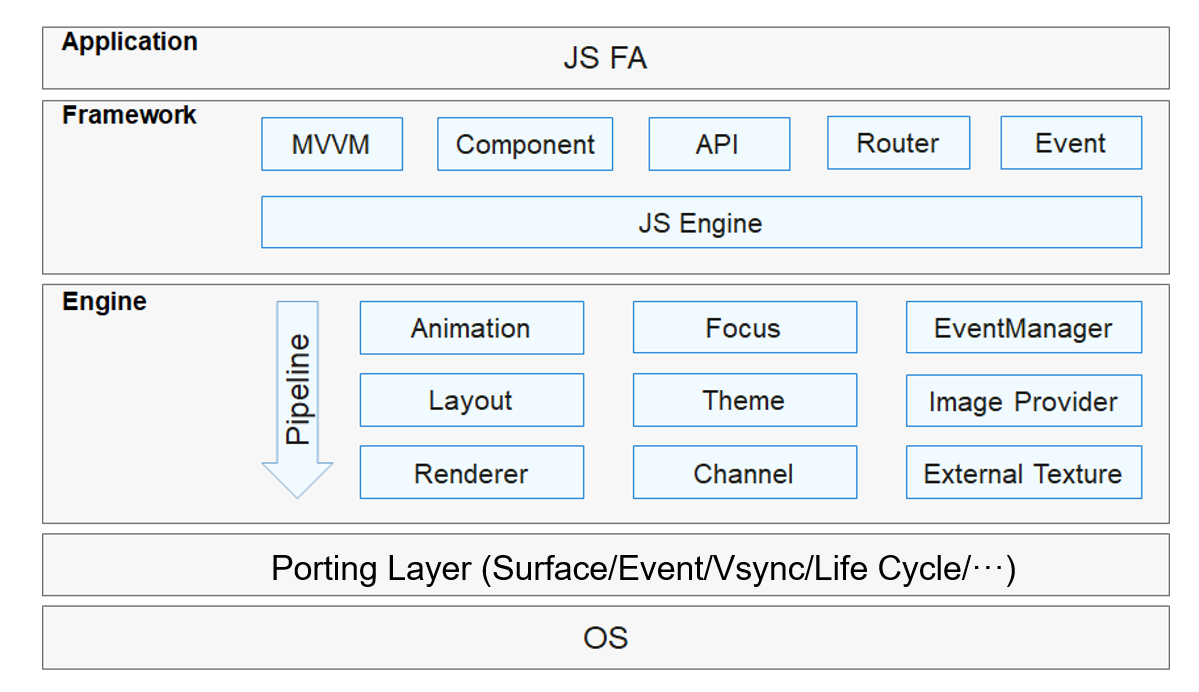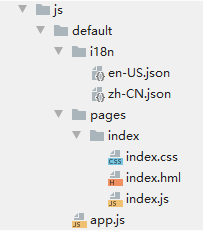开源鸿蒙 JS UI Framework
JS UI Framework
Introduction
The OpenHarmony JS UI framework provides basic, container, and canvas UI components and standard CSS animation capabilities. It supports the web-development-like programming paradigm.
Web-development-like paradigm
The JS UI framework supports languages that are similar to those for web development, such as HTML and CSS. You can use them to describe the page layout and style, and use JavaScript (conforming to the ECMAScript specification) for page behavior. This paradigm allows you to avoid code for UI state switching. The view configuration information is intuitive.

The JS UI framework consists of the application, framework, engine, and porting layers.
Application
Contains applications with Feature Abilities (FAs) developed with the JS UI framework. The FA application in this document refers to the application with FAs developed using JavaScript.
Framework
Parses UI pages and provides the Model-View-ViewModel (MVVM), page routing, custom components and more for front end development.
Engine
Accomplishes animation parsing, Document Object Model (DOM) building, layout computing, rendering command–based building and drawing, and event management.
Porting Layer
Abstracts the platform layer to provide interfaces for the interconnection with the OS. For example, interconnections of events, rendering pipelines, and lifecycles.
Directory Structure
The source code of the framework is stored in /foundation/ace. The following shows the directory structure.
/foundation/ace
├── ace_engine # JS UI framework
├── ace_engine_lite # JS UI framework for the mini system and above
└── napi # JS APIs for extending the native development module
Usage
- JavaScript FA development directory
After a project is created, its js directory is displayed.
Figure 2 Development directory

The i18n directory stores JSON files for various locales. A pages subfolder contains multiple pages and each consists of .hml, .css, and .js files.
main > js > default > i18n > en-US.json: defines the variables displayed on pages in English. Similarly, zh-CN.json defines the page content in Chinese.
{ "strings": { "hello": "Hello", "world": "World" } }main > js > default > pages > index > index.hml: describes the layout of the index page, components used on the page, and the hierarchy of these components. For example, there is a text component for displaying Hello World.
<div class ="container"> <text class ="title"> {{ $t('strings.hello') }} {{title}} </text> </div>main > js > default > pages > index > index.css: defines the style of the index page. For example, the following index.css code snippet describes how container and title will be displayed on the page:
.container { flex-direction: column; justify-content: center; align-items: center; } .title { font-size: 100px; }main > js > default > pages > index > index.js: defines the service logic on the index page, such as data binding and event processing. In this example, the string World is assigned to title.
export default { data: { title: '', }, onInit() { this.title = this.$t('strings.world'); }, }
Repositories Involved
JS UI framework
你可能感兴趣的文章
- 所属分类: 后端技术
- 本文标签:
热门推荐
-
2、 - 优质文章
-
3、 gate.io
-
8、 golang
-
9、 openharmony
-
10、 Vue中input框自动聚焦